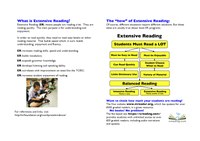
Photo from wikipedia
Increased use of recent technological devices by language learners at all ages and various levels stimulates the integration of the latest technological devices into the language learning process. Considering the… Click to show full abstract
Increased use of recent technological devices by language learners at all ages and various levels stimulates the integration of the latest technological devices into the language learning process. Considering the numerous advantages of augmented reality (AR) in creating a supportive learning environment, this study aimed at investigating the use of quick response codes, as an AR feature, during extensive reading. 28 English as a Foreign Language (EFL) students enrolled in a British culture course at a Turkish university participated in the study. For the purpose of the study, QR code enhanced authentic reading texts were designed to aid learners in the comprehension of culture-specific terms that were difficult to be understood with a dictionary definition. Participants reflected on each QR code implementation, and semi-structured interviews were conducted with randomly selected students. The results of qualitative analysis through open-axial and selective coding procedure revealed three main themes related to QR code enhancement while reading culturally loaded reading texts: the advantages of using QR codes in extensive reading, criticism on the content of QR codes, and technical problems in using QR codes. The findings underline the potential of integrating AR technology such as the QR codes into language education for more effective learning opportunities and highlight the importance of providing access to technology in order to help all students benefit from the ubiquitous nature of technology.
Journal Title: Education and Information Technologies
Year Published: 2021
Link to full text (if available)
Share on Social Media: Sign Up to like & get
recommendations!